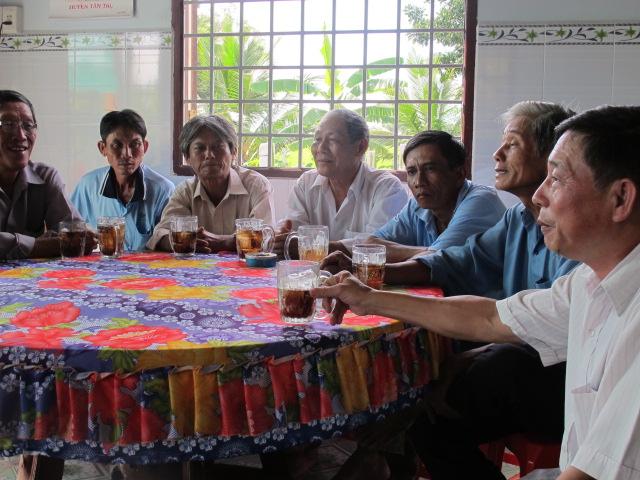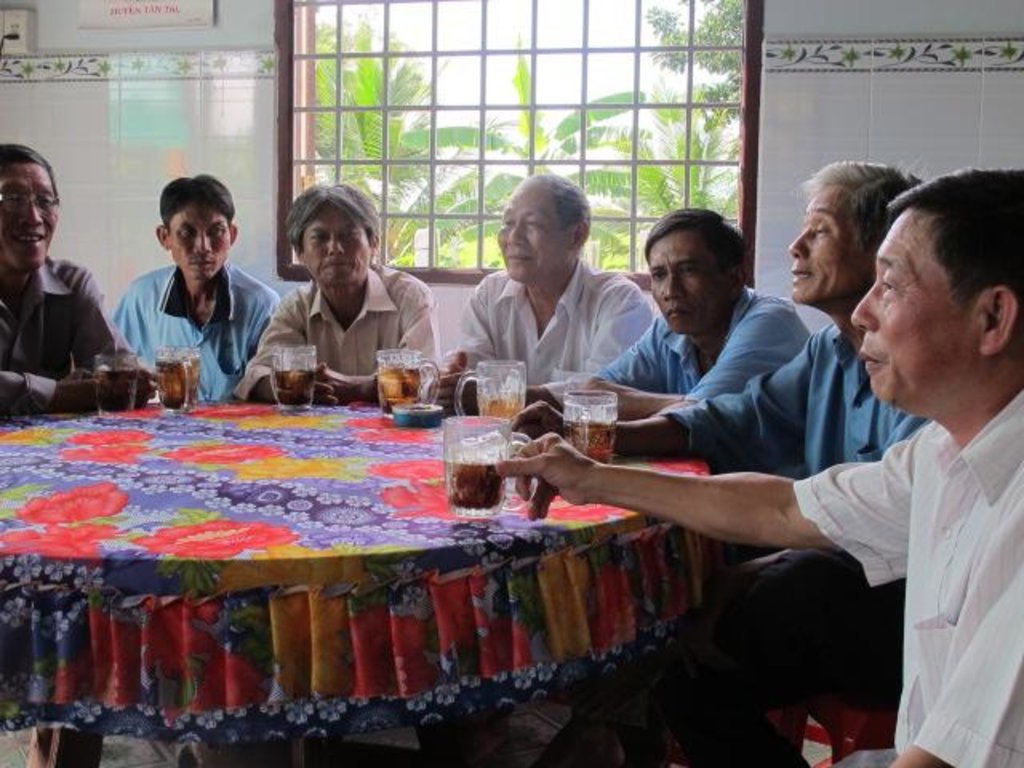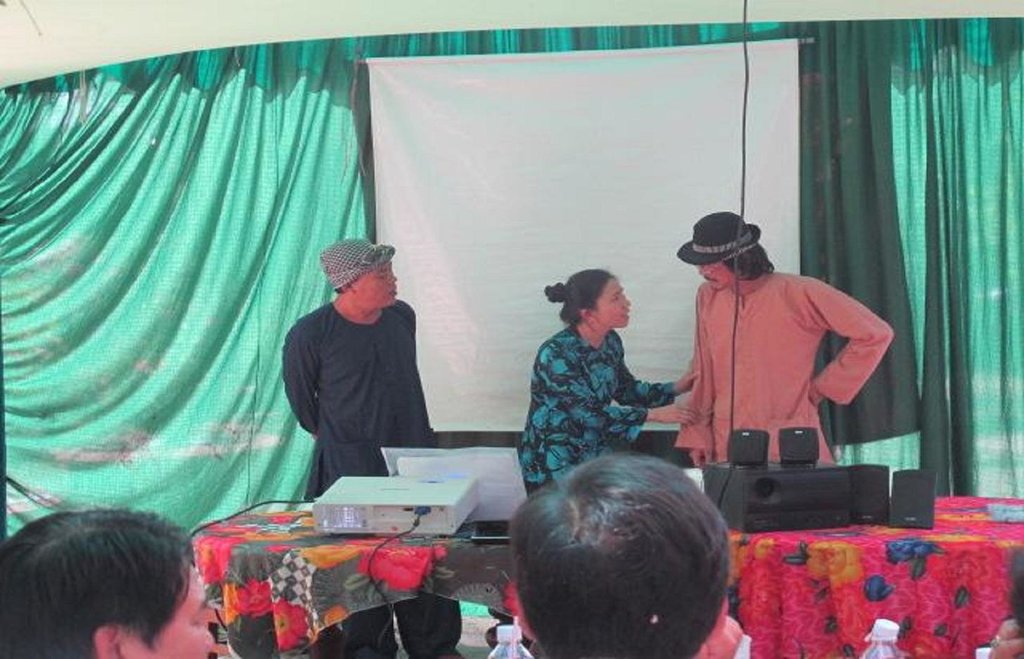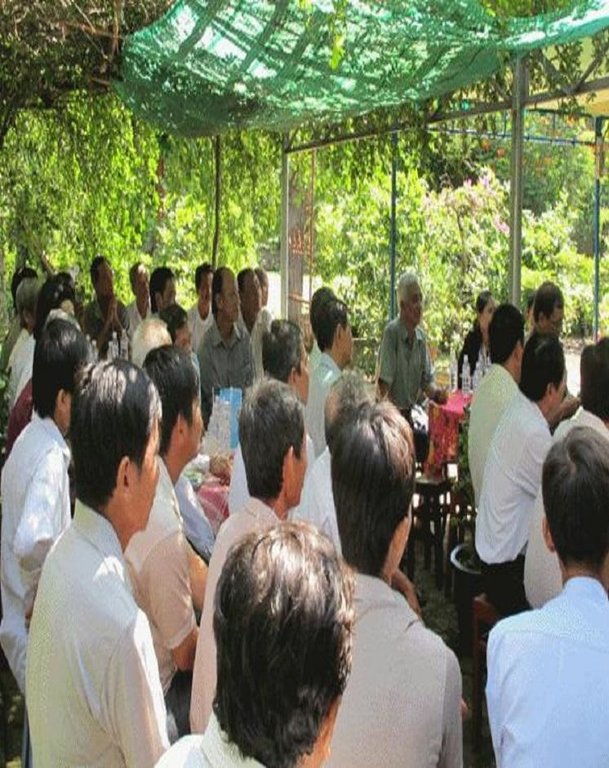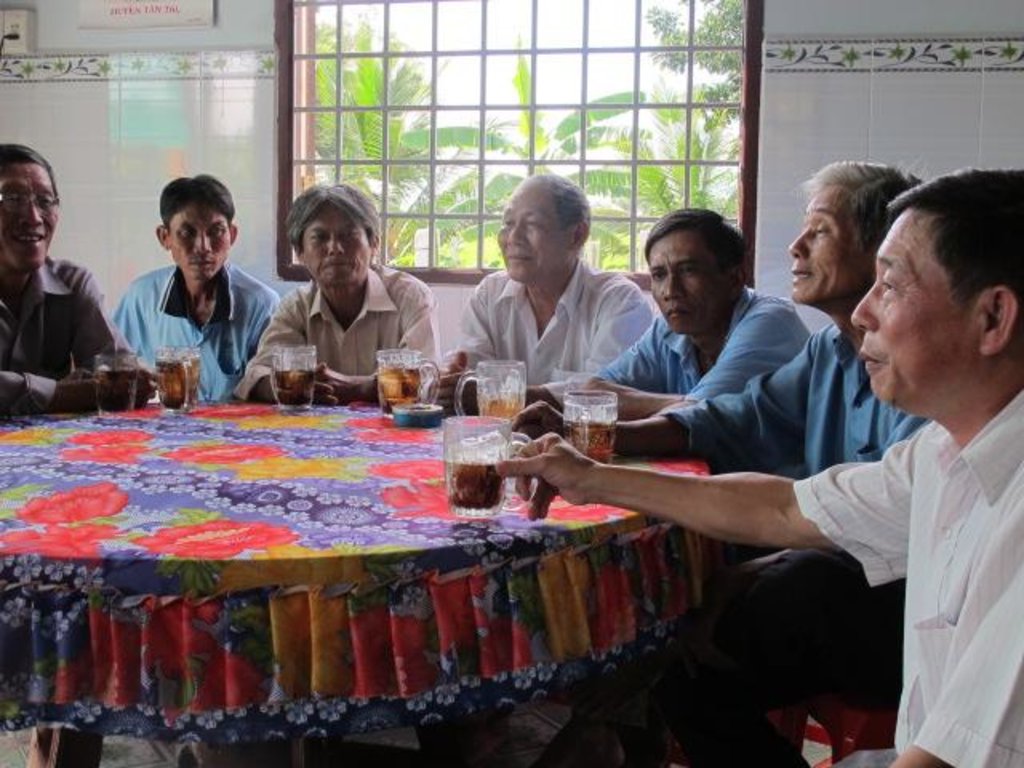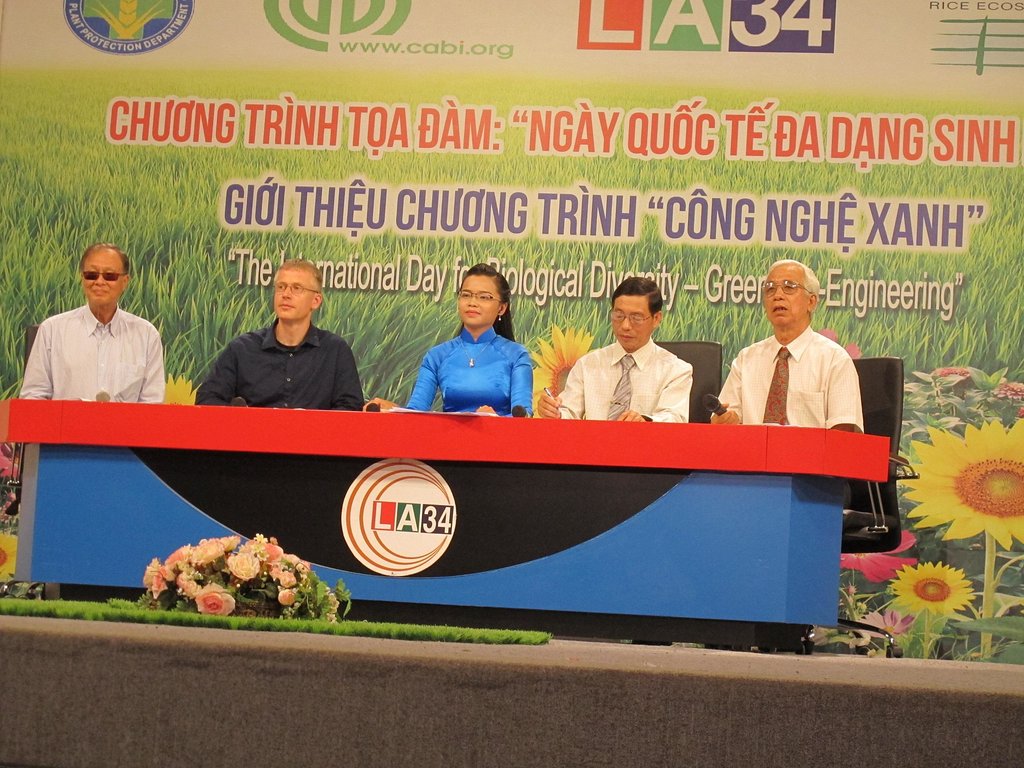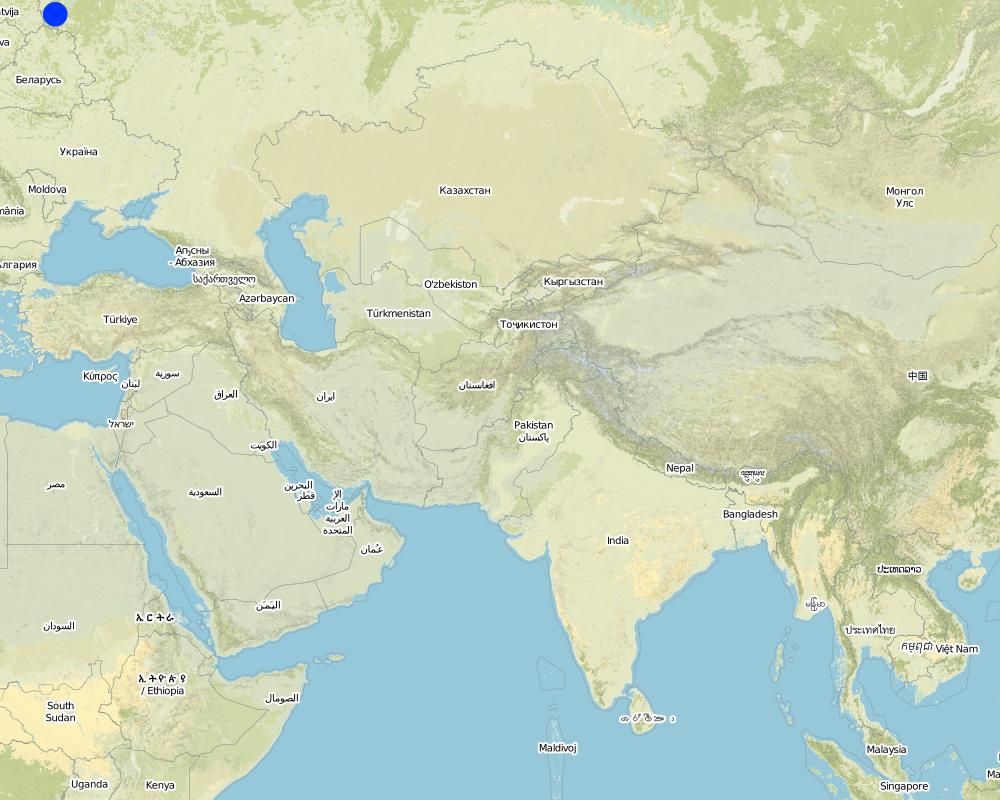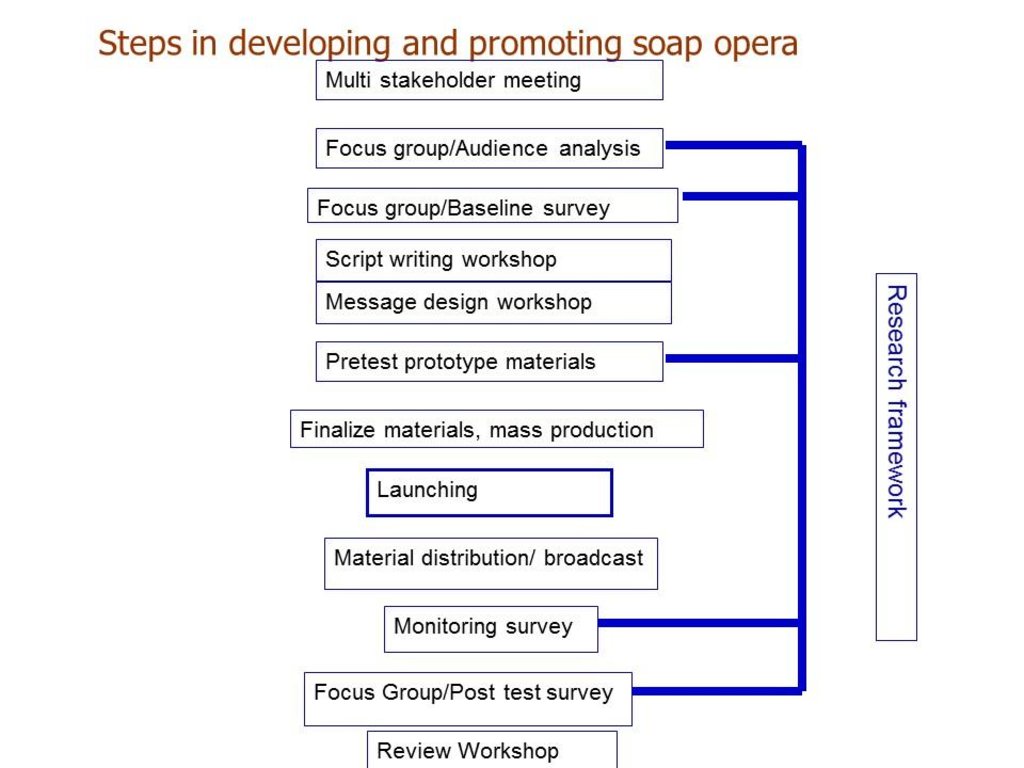Entertainment-education for ecological engineering [เวียดนาม]
- ผู้สร้างสรรค์:
- การอัพเดท:
- ผู้รวบรวม: Monina Escalada
- ผู้เรียบเรียง: –
- ผู้ตรวจสอบ: Fabian Ottiger
Cong Nghe Xanh (Vietnamese)
approaches_2613 - เวียดนาม
ดูส่วนย่อย
ขยายทั้งหมด ย่อทั้งหมด1. ข้อมูลทั่วไป
1.2 รายละเอียดที่ติดต่อได้ของผู้รวบรวมและองค์กรที่เกี่ยวข้องในการประเมินและการจัดเตรียมทำเอกสารของแนวทาง
ผู้เชี่ยวชาญ SLM:
Heong Kong Luen
+60 11-3604 7833
kl.heong@gmail.com
Centre for Agricultural BioSciences International (CABI) South East Asia Regional Centre
PO Box 210, 43400 UPM Serdang
มาเลเซีย
ผู้เชี่ยวชาญ SLM:
Settele Josef
+49(0)345 558 5320
Josef.Settele@ufz.de
Helmholtz-Zentrum für Umweltforschung GmbH - UFZ
Theodor-Lieser-Straße 4 Halle 06120
เยอรมนี
ชื่อของโครงการซึ่งอำนวยความสะดวกในการทำเอกสารหรือการประเมินแนวทาง (ถ้าเกี่ยวข้อง)
Visayas State University (VSU) - ฟิลิปปินส์ชื่อของโครงการซึ่งอำนวยความสะดวกในการทำเอกสารหรือการประเมินแนวทาง (ถ้าเกี่ยวข้อง)
Helmholtz Centre for Environmental Research (UFZ) - เยอรมนีชื่อของโครงการซึ่งอำนวยความสะดวกในการทำเอกสารหรือการประเมินแนวทาง (ถ้าเกี่ยวข้อง)
Centre for Agricultural BioSciences International (CABI) - สหราชอาณาจักร1.3 เงื่อนไขที่เกี่ยวข้องกับการใช้ข้อมูลที่ได้บันทึกไว้ผ่านทาง WOCAT
ผู้รวบรวมและวิทยากรหลักยอมรับเงื่อนไขเกี่ยวกับการใช้ข้อมูลที่ถูกบันทึกผ่านทาง WOCAT:
ใช่
2. คำอธิบายของแนวทาง SLM
2.1 การอธิบายแบบสั้น ๆ ของแนวทาง
Entertainment-education for ecological engineering involves a series of TV pro-grammes that educate rice farmers about ecosystem services, as well as ecologi-cal engineering techniques to conserve biodiversity in rice landscapes.
2.2 การอธิบายอย่างละเอียดของแนวทาง
การอธิบายอย่างละเอียดของแนวทาง:
Aims / objectives: A multi-stakeholder participatory process was adopted in formative research, then designing and developing a soap-opera series, launching the programme, followed by implementing on-the-ground support, and monitoring of progress. The stakeholders involved were from research, extension, a video production company and local government. To make sure the educational content was accurately and seamlessly woven into drama, the collaborating team was composed of technical experts and scriptwriters, nicknamed the ‘‘turtles and peacocks’’. Each 15-minute episode is composed of 3 parts: a short drama by comedians, an explanation by experts, and then a summary of the lesson portrayed in that particular episode.
Methods: The LEGATO TV series was produced by Viet Idea, a video company based in Ho Chi Minh City, and was broadcast on Long An TV (LA34) weekly for 20 weeks. The 18 episodes were based on the values grid that LEGATO scientists had developed. They covered a range of topics including organic matter decomposition, organisms and microorganisms, straw burning, rural habitats, the food chain, the architecture of traditional houses, the role of silicon in rice production, honey bees, plant health, eco-tourism and eco-engineering.
Stages of implementation: To popularize and enhance the viewership of the LEGATO Ecological Engineering TV series, a “Meet the Actors Day” was organized in Khanh Hau village, Tan An Town, Long An Province. The organisers comprised “Cong Nghe Xanh”, Long An TV (LA34), Y Tuong Viet (Idea Vietnam), and the Southern Regional Plant Protection Centre. The event was attended by the village People’s Committee Chair, farmers, Long An TV staff and plant protection officers. The “Meet the Actors” day is one of the elements in the entertainment-education approach. To track viewership and audience reactions to the TV series, four focus group discussions (FGDs) were conducted with 41 rice farmers in four villages in Long An province. A post-broadcast survey was carried out in January 2015 among 396 randomly selected rice farmers in Long An and Tien Giang Provinces.
Role of stakeholders: The role of the different stakeholders in the approach was as follows: 1) Farmers provided feedback on the relevance and usefulness of the TV episodes and sug-gested other topics; 2) Plant protection officers worked with TV episode scriptwriters and served as subject matter specialists to simplify the educational content of each episode; 3) Local plant protection experts provided the scientific explanation behind the topics tackled in the episodes; 4) Local government was represented by Dr Nguyen Van Khang, former Director of Agriculture in Tien Giang province who agreed to allocate a portion of the provincial pesticide budget into ecological engineering demonstrations as he required data to be generated locally. Since then, from 2010 to 2014, more demonstration fields were set up.
Other important information: Preliminary analyses showed no significant differences in farmers’ insecticide use, but significant differences were found in beliefs and positions about growing flowers, biocontrol, and silicon use. A follow-up farmer survey was conducted to further eval-uate the effects of the TV series on rice farmers in Tien Giang and Long An Provinces.
2.3 รูปภาพของแนวทาง
2.5 ประเทศ ภูมิภาค หรือสถานที่ตั้งที่ได้นำแนวทางไปใช้
ประเทศ:
เวียดนาม
ภูมิภาค/รัฐ/จังหวัด: :
Long An and Tien Giang
ข้อมูลเฉพาะเพิ่มเติมของสถานที่ตั้ง:
Tan An town, Tan Tru, Thu Thua, Ben Luc, Chau Thanh,Tan Phuoc, Cai Lay
Map
×2.6 วันที่เริ่มต้นและสิ้นสุดของแนวทาง
ระบุปีที่เริ่ม:
2014
การสิ้นสุดลง (ถ้าแนวทางไม่ได้ใช้อีกต่อไป):
2016
2.7 ประเภทของแนวทาง
- เป็นนวัตกรรมท้องถิ่นล่าสุด/ นวัตกรรมใหม่
2.8 เป้าหมายหรือวัตถุประสงค์หลักของแนวทาง
The Approach focused on SLM only (reducing insecticide use, restoring biodiversity in rice landscapes )
Improve farmers’ pest management, reduce their insecticide use and improve their land use to include conservation of biodiversity.
The SLM Approach addressed the following problems: Lack of funds to support SLM; Unregulated pesticide marketing continues to negate the gains obtained by SLM.
2.9 เงื่อนไขที่เอื้ออำนวยหรือเป็นอุปสรรคต่อการนำเทคโนโลยีภายใต้แนวทางนี้ไปปฏิบัติใช้
บรรทัดฐานและค่านิยมทางสังคม วัฒนธรรม ศาสนา
- เป็นอุปสรรค
Educate farmers to appreciate parasitoids that are too tiny to be seen by the naked eye.
Treatment through the SLM Approach: As the parasitoids and bees belong to the same insect group, hymenoptera, we associated parasitoids with bees that farmers are familiar with.
การมีไว้ให้หรือการเข้าถึงแหล่งการเงินและบริการ
- เป็นอุปสรรค
Funds to support education system.
Treatment through the SLM Approach: Encourage local governments to provide support.
การจัดตั้งระดับองค์กร
- เป็นอุปสรรค
Lack of direct linkage between agricultural and TV broadcast stations.
Treatment through the SLM Approach: Use stakeholder meetings and field activities to establish these new links.
กรอบแนวทางในการดำเนินการด้านกฎหมาย (การถือครองที่ดิน สิทธิในการใช้ที่ดินและน้ำ)
- เอื้ออำนวย
The existing land ownership, land use rights / water rights helped a little the approach implementation
ความรู้เกี่ยวกับ SLM การเข้าถึงการสนับสนุนด้านเทคนิค
- เป็นอุปสรรค
Technical information.
Treatment through the SLM Approach: Explore research findings for information.
ปริมาณงานที่ทำได้ กำลังคนที่มีให้
- เป็นอุปสรรค
Lack of work force dedicated to this entertainment-education process.
Treatment through the SLM Approach: Encourage provincial government to allocate more staff who can simplify and disseminate scientific information.
อื่นๆ
- เป็นอุปสรรค
Unregulated pesticide sales continue to erode gains from education.
Treatment through the SLM Approach: Encourage government to review and reform current pesticide sales regulations.
3. การมีส่วนร่วมและบทบาทของผู้มีส่วนได้ส่วนเสียที่เกี่ยวข้อง
3.1 ผู้มีส่วนได้ส่วนเสียที่เกี่ยวข้องในแนวทางนี้และบทบาท
- ผู้ใช้ที่ดินระดับท้องถิ่นหรือชุมชนระดับท้องถิ่น
Communication specialist (female), regional director of plant protection (male), ecologist (male)
Farmers, male and female, Vietnamese
- ผู้เชี่ยวชาญ SLM หรือที่ปรึกษาการเกษตร
Ecologist (male), plant protection director (male)
- นักวิจัย
Visayas State University, Leyte, Philippines
- รัฐบาลระดับท้องถิ่น
Local government of Long An province
People's Committee chair (provincial)
- รัฐบาลแห่งชาติ (ผู้วางแผน ผู้ทำการตัดสินใจ)
- องค์การระหว่างประเทศ
Center for Agricultural BioSciences International (CABI), Malaysia
3.2 การเกี่ยวข้องของผู้ใช้ที่ดินระดับท้องถิ่นหรือชุมชนระดับท้องถิ่นในช่วงต่างๆของแนวทาง
| ความเกี่ยวข้องของผู้ใช้ที่ดินระดับท้องถิ่นหรือชุมชนระดับท้องถิ่น | ระบุผู้ที่มีส่วนเกี่ยวข้องและอธิบายกิจกรรม | |
|---|---|---|
| การริเริ่มหรือการจูงใจ | ไม่ลงมือ | SLM promoters |
| การวางแผน | ปฏิสัมพันธ์ | All stakeholders |
| การดำเนินการ | ระดมกำลังด้วยตนเอง | All stakeholders |
| การติดตามตรวจสอบหรือการประเมินผล | ระดมกำลังด้วยตนเอง | SLM promoters and local implementers |
| Research | ปฏิสัมพันธ์ | SLM promoters |
3.3 แผนผังแสดงขั้นตอนการทำงาน (ถ้ามี)
คำอธิบาย:
Steps in developing and promoting a soap opera
ผู้เขียน:
Kong Luen Heong, Monina Escalada (CABI, Kuala Lumpur; Visayas State University)
3.4 การตัดสินใจเลือกใช้เทคโนโลยี SLM
ระบุผู้ที่ทำการตัดสินใจเลือกเทคโนโลยีมากกว่าหนึ่งวิธีไปปฏิบัติใช้:
- ผู้เชี่ยวชาญ SLM เป็นผู้ตัดสินใจหลัก ที่ติดตามให้คำปรึกษากับผู้ใช้ที่ดิน
การอธิบาย:
A stakeholder consultation workshop was organized at the initial stage.
Decisions on the method of implementing the SLM Technology were made by mainly by SLM specialists with consultation of land users. Through stakeholder consultation and focus group discussions
4. การสนับสนุนด้านเทคนิค การสร้างขีดความสามารถ และการจัดการด้านความรู้
4.1 การสร้างขีดความสามารถ / การอบรม
ได้มีการจัดอบรมให้แก่ผู้ใช้ที่ดินหรือผู้มีส่วนได้ส่วนเสียคนอื่น ๆ หรือไม่:
ใช่
ให้ระบุว่าใครเป็นผู้ได้รับการอบรม:
- ผู้ใช้ที่ดิน
- เจ้าหน้าที่ภาคสนาม / ที่ปรึกษา
รูปแบบการอบรม:
- กำลังดำเนินการ
- เกษตรกรกับเกษตรกร
- ใช้พื้นที่ทำการสาธิต
- จัดการประชุมสู่สาธารณชน
รูปแบบการอบรม:
- Communication campaign
หัวข้อที่พูด:
Principles of ecological engineering and pest management
4.2 การบริการให้คำแนะนำ
ผู้ใช้ที่ดินมีการเข้าถึงการรับบริการให้คำปรึกษาหรือไม่:
ใช่
- Consultation
4.3 การเสริมความแข็งแกร่งให้กับสถาบัน (การพัฒนาองค์กร)
สถาบันได้รับการจัดตั้งขึ้นมาหรือเสริมความแข็งแกร่งโดยแนวทางนี้หรือไม่:
- ไม่
4.4 การติดตามตรวจสอบและประเมินผล
การติดตามตรวจสอบและประเมินผลเป็นส่วนหนึ่งของแนวทางหรือไม่:
ใช่
ความคิดเห็น:
socio-cultural aspects were regular monitored by land users through observations
socio-cultural aspects were regular monitored by land users through measurements
There were no changes in the Approach as a result of monitoring and evaluation
There were no changes in the Technology as a result of monitoring and evaluation
4.5 การวิจัย
การวิจัยเป็นส่วนหนึ่งของแนวทางหรือไม่:
ใช่
ระบุหัวข้อเรื่อง:
- นิเวศวิทยา
ให้ข้อมูลเพิ่มเติมและให้ระบุผู้ทำการวิจัย:
Research was carried out on-farm
5. การสนับสนุนด้านการเงินและวัสดุอุปกรณ์
5.1 ระบุงบประมาณประจำปีสำหรับแนวทาง SLM นี้
ถ้าหากว่างบประมาณประจำปีไม่เป็นที่ทราบแน่นอน ให้ระบุช่วงลงไป:
- 10,000-100,000
แสดงความคิดเห็น (แหล่งของการระดมทุน ผู้บริจาคคนสำคัญ):
Approach costs were met by the following donors: international (German Ministry of Education and Research, BMBF (70,000 USD)): 70.0%; government (30,000 USD): 30.0%
5.2 การสนับสนุนด้านการเงิน / วัสดุอุปกรณ์ให้แก่ผู้ใช้ที่ดิน
ผู้ใช้ที่ดินได้รับการสนับสนุนด้านการเงิน / วัสดุอุปกรณ์ไปปฏิบัติใช้เทคโนโลยีหรือไม่:
ใช่
5.3 เงินสนับสนุนสำหรับปัจจัยนำเข้า (รวมถึงแรงงาน)
- การเกษตร
| ระบุปัจจัยนำเข้าที่ได้รับการสนับสนุน | เห็นด้วยระดับไหน | ระบุเงินสนับสนุน |
|---|---|---|
| Flower seedlings | ได้รับการช่วยเหลือทางการเงินบางส่วน | |
ถ้าแรงงานโดยผู้ใช้ที่ดินเป็นปัจจัยนำเข้าที่มีอยู่มากมาย ระบุด้วยว่าเนื่องจาก:
- สมัครใจ
5.4 เครดิต
มีการจัดหาเครดิตมาให้ภายใต้แนวทาง SLM หรือไม่:
ไม่ใช่
6. การวิเคราะห์ผลกระทบและการสรุป
6.1 ผลกระทบของแนวทาง
ช่วยให้ผู้ใช้ที่ดินนำเอาเทคโนโลยี SLMไปใช้และบำรุงรักษาสภาพไว้ได้หรือไม่:
- ไม่ใช่
- ใช่ เล็กน้อย
- ใช่ ปานกลาง
- ใช่ อย่างมาก
Reduction in fertilizer and pesticide use
ทำให้กลุ่มด้อยโอกาสมีอำนาจทางสังคมและเศรษฐกิจหรือไม่:
- ไม่ใช่
- ใช่ เล็กน้อย
- ใช่ ปานกลาง
- ใช่ อย่างมาก
ปรับปรุงประเด็นของการถือครองที่ดินหรือสิทธิในการใช้ ซึ่งขัดขวางการนำเทคโนโลยีไปใช้ให้ดีขึ้น:
- ไม่ใช่
- ใช่ เล็กน้อย
- ใช่ ปานกลาง
- ใช่ อย่างมาก
The problem is likely to be overcome in the near future.
Did other land users / projects adopt the Approach?
- ไม่ใช่
- ใช่ เล็กน้อย
- ใช่ ปานกลาง
- ใช่ อย่างมาก
Did the Approach lead to improved livelihoods / human well-being?
- ไม่ใช่
- ใช่ เล็กน้อย
- ใช่ ปานกลาง
- ใช่ อย่างมาก
Did the Approach help to alleviate poverty?
- ไม่ใช่
- ใช่ เล็กน้อย
- ใช่ ปานกลาง
- ใช่ อย่างมาก
6.2 แรงจูงใจหลักของผู้ใช้ที่ดินเพื่อที่จะนำ SLM ไปปฏิบัติใช้
- การผลิตที่เพิ่มขึ้น
- กำไร (ความสามารถ) อัตราส่วนค่าใช้จ่ายต่อผลประโยชน์ที่เพิ่มขึ้น
- จิตสำนึกด้านสิ่งแวดล้อม
6.3 ความยั่งยืนของกิจกรรมของแนวทาง
ผู้ใช้ที่ดินสามารถทำให้สิ่งต่างๆ ที่ได้ปฏิบัติใช้โดยแนวทางนี้ยั่งยืนได้หรือไม่ (โดยไม่มีการสนับสนุนจากภายนอก):
- ไม่แน่ใจ
6.4 จุดแข็งและข้อได้เปรียบของแนวทาง
| จุดแข็ง / ข้อได้เปรียบของแนวทางในทัศนคติของผู้ใช้ที่ดิน |
|---|
| Our research partners find the use of Entertainment-Education an easy approach to implement as there is often a warm response from the audience - farmers, women's groups and local government officials. |
| จุดแข็ง / ข้อได้เปรียบของแนวทางในทัศนคติของผู้รวบรวมหรือวิทยากรหลัก |
|---|
|
The use of entertainment-education approach has been found to be highly successful in Vietnam. An evaluation survey of a radio drama program we launched in 2004, after completion of the program, showed that farmers who had listened to at least two episodes of the program reduced their insecticide sprays by 60%, their fertilizer and seed rates by 9% and 33% respectively (Heong et al., 2008). (How to sustain/ enhance this strength: It can be sustained if there is funding to support the activities.) |
6.5 จุดอ่อน / ข้อเสียเปรียบของแนวทางและวิธีในการแก้ไข
| จุดอ่อน / ข้อเสียเปรียบในทัศนคติของผู้ใช้ที่ดิน | สามารถแก้ไขปัญหาได้อย่างไร |
|---|---|
| The land users would rely on funding to be able to implement this approach as there is a cost in producing the TV series. |
| จุดอ่อน / ข้อเสียเปรียบในทัศนคติของผู้รวบรวมหรือวิทยากรหลัก | สามารถแก้ไขปัญหาได้อย่างไร |
|---|---|
| An important challenge is the longer-term sustainability of the TV series. The challenge is to mainstream such programs into the TV station’s regular programming. To maintain a long TV series will require funding. A further threat to sustain the gains made by the TV series is “advertising piracy” where the TV series is being used to advertise new pesticides. |
7. การอ้างอิงและการเชื่อมต่อ
7.1 วิธีการหรือแหล่งข้อมูล
- ไปเยี่ยมชมภาคสนาม การสำรวจพื้นที่ภาคสนาม
- การสัมภาษณ์กับผู้ใช้ที่ดิน
7.2 การอ้างอิงถึงสิ่งตีพิมพ์
ชื่อเรื่อง ผู้เขียน ปี ISBN:
Westpal, Catrin, Vidal, Stefan, Horgan, Finbarr G., Gurr, Geoff M., Escalada, Monina, Chien, Ho Van, Tscharntke, Teja, Heong, Kong Luen & Settele, Josef. (2015). Promoting multiple ecosystem services with flower strips and participatory approaches in rice production landscapes. Basic and Applied EcologyHeong, K.L., Escalada, M.M., Chien, H.V. and Cuong, L,Q. 2014. Restoration of rice landscape biodiversity by farmers in Vietnam through education and motivation using media. In G. Mainguy (ed) Special issue on large scale restoration of ecosystems. S.A.P.I.E.N.S (online) Vol 7 No. 2. http://sapiens.revues.org/1578. Electronic ISSN 1993-3819Heong, K.L., Escalada, M.M., Huan, N.H., Ky Ba, V.H., Quynh, P.V., Thiet, L.V. and Chien, H.V. 2008. Entertainment-Education and rice pest management: A radio soap opera in Vietnam. Crop Protection, 27: 1392-1397.
ช่องทางในการสืบค้น และราคา:
Basic and Applied EcologyG. Mainguy (ed) Special issue on large scale restoration of ecosystems. S.A.P.I.E.N.S (online) Vol 7 No. 2. http://sapiens.revues.org/1578. Electronic ISSN 1993-3819 Crop Protection, 27: 1392-1397.
ชื่อเรื่อง ผู้เขียน ปี ISBN:
Heong, K.L., Escalada, M.M., Chien, H.V. and Cuong, L,Q. 2014. Restoration of rice landscape biodiversity by farmers in Vietnam through education and motivation using media. In G. Mainguy (ed) Special issue on large scale restoration of ecosystems. S.A.P.I.E.N.S (online) Vol 7 No. 2. http://sapiens.revues.org/1578. Electronic ISSN 1993-3819
ช่องทางในการสืบค้น และราคา:
G. Mainguy (ed) Special issue on large scale restoration of ecosystems. S.A.P.I.E.N.S (online) Vol 7 No. 2. http://sapiens.revues.org/1578. Electronic ISSN 1993-3819
ชื่อเรื่อง ผู้เขียน ปี ISBN:
Heong, K.L., Escalada, M.M., Huan, N.H., Ky Ba, V.H., Quynh, P.V., Thiet, L.V. and Chien, H.V. 2008. Entertainment-Education and rice pest management: A radio soap opera in Vietnam. Crop Protection, 27: 1392-1397.
ช่องทางในการสืบค้น และราคา:
Crop Protection, 27: 1392-1397.
ลิงก์และโมดูล
ขยายทั้งหมด ย่อทั้งหมดลิงก์
ไม่มีลิงก์
โมดูล
ไม่มีโมดูล


